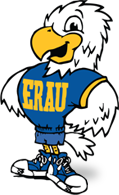Embry-Riddle offers a wide array of majors for students to study. While everyone probably knows an Aeronautical Science or Aerospace Engineer major, how many can say they know a Communication major? In fact, the most common question I get asked as a Communication major is “why did you come to Embry-Riddle for Communication?”
I recently finished my second year at Embry-Riddle, but my journey at this university did not start in the Communication program. I was a meteorology major with an interest in one day becoming a broadcast meteorologist, but not thrilled about all the heavy technical classes the degree entailed. However, I was intrigued by the Communication program, and how it allowed me to still achieve my future goals from a different perspective.
The communication major is a small program, with enough students to fit in one average sized classroom in the College of Arts and Sciences. This allows students to make close connections with professors in the Humanities and Communication department, and build friendships with other students in the major since you have at least 2 or 3 classes with them a semester. I have really valued the connections with fellow students and faculty that this program has helped foster.
Communications is also a unique program at Embry-Riddle, letting students get a blend of communication and science courses that you don’t get at most schools. These include courses in social media, communication theory, public relations, and science/technology communication. Communication majors are required to choose a minor as a part of their degree plan, letting students choose what they want to concentrate their studies on. Students have minors ranging from Marketing, Latin American Studies, and Global Conflict Studies.
Many students in the major, including myself, are on the Broadcast Meteorology track. This allows students to still take many of the same weather classes that Meteorology majors take, but also learn how to effectively communicate science and complex topics to the general public. Recent graduates on this track have gotten jobs at news stations as meteorologists around the country because of their skills gained from this track like no other university in the country offers.
The Communication program also offers great opportunities for undergraduate research through courses and with professors. One example of this is the annual Humanities and Communication Research Symposium that occurs at the end of each semester, and allows students from different research and theory courses to present their work from the semester.
While it might not be the first program people think of when they think Embry-Riddle, the Communication major is a flourishing program in the College of Arts and Sciences that allows all students to succeed in a way that only Embry-Riddle can provide.


